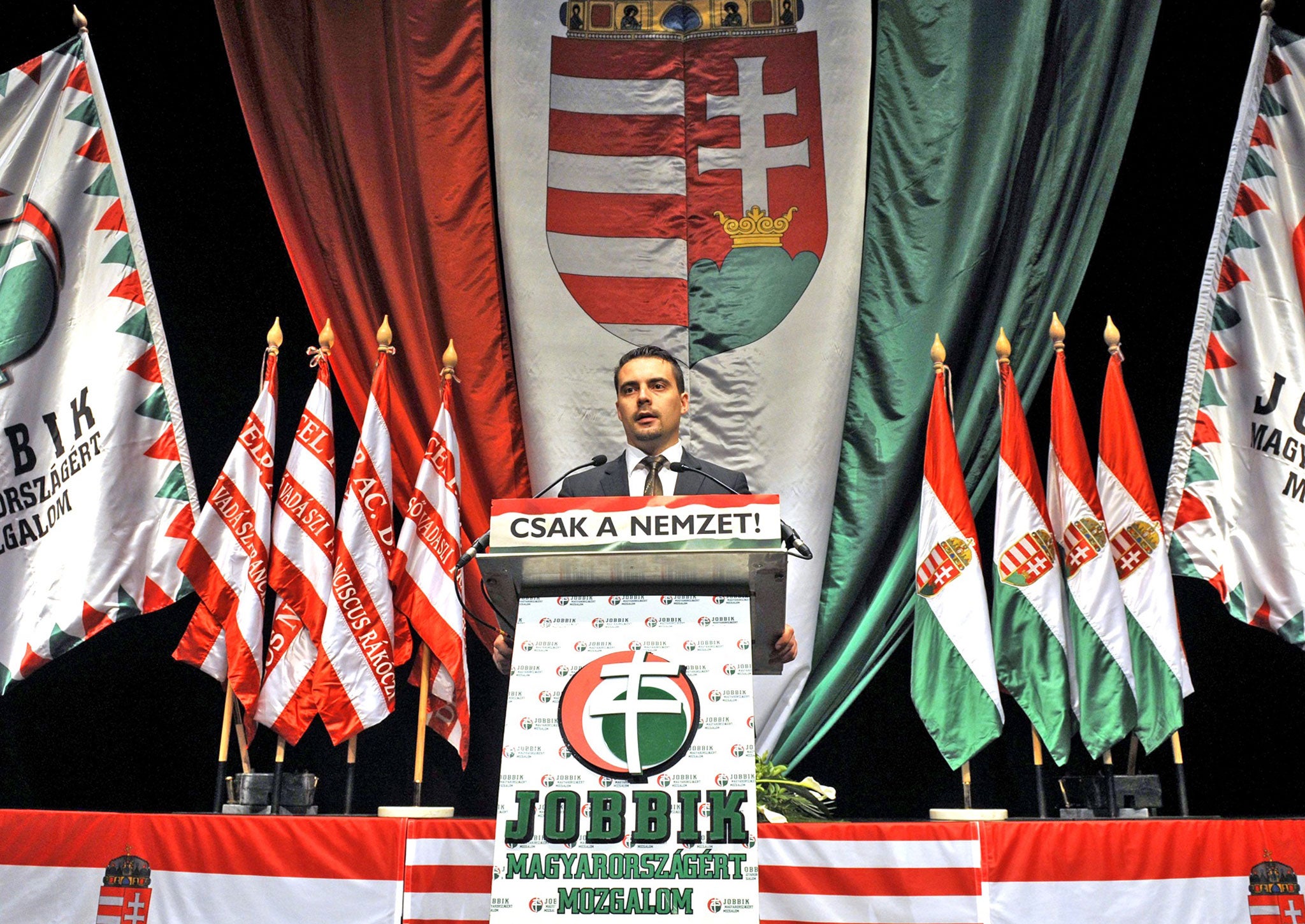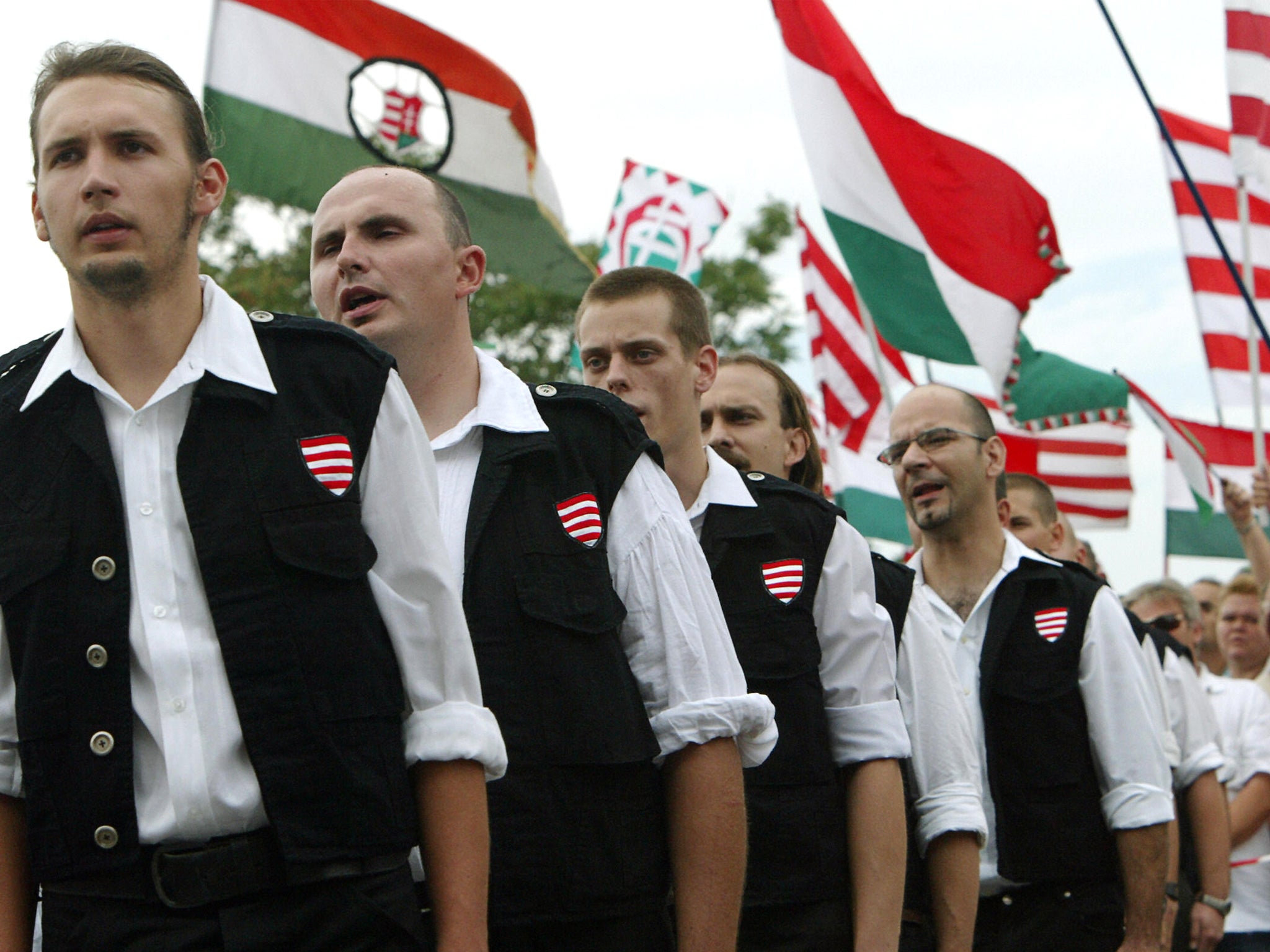Owen Jones: A visit by the leader of Hungary’s poisonous Jobbik party reminds us that we can’t just wish away anti-Semitism
This bigotry has clothed itself both as anti-capitalism and as anti-Communism

Your support helps us to tell the story
From reproductive rights to climate change to Big Tech, The Independent is on the ground when the story is developing. Whether it's investigating the financials of Elon Musk's pro-Trump PAC or producing our latest documentary, 'The A Word', which shines a light on the American women fighting for reproductive rights, we know how important it is to parse out the facts from the messaging.
At such a critical moment in US history, we need reporters on the ground. Your donation allows us to keep sending journalists to speak to both sides of the story.
The Independent is trusted by Americans across the entire political spectrum. And unlike many other quality news outlets, we choose not to lock Americans out of our reporting and analysis with paywalls. We believe quality journalism should be available to everyone, paid for by those who can afford it.
Your support makes all the difference.Anti-Semitism sometimes risks being unintentionally disregarded as a sudden eruption of madness in 20th-century Europe, a barbarous era almost too removed from the banalities of our everyday lives to be imagined. How distant from the Europe of 2014 it seems: a Continent of cheap-and-cheerful package holidays, dour Brussels technocrats, the campness of Eurovision, the thrill of the Uefa championships. Almost too difficult to absorb, then, that a few decades ago, educated, “civilised” Europeans were cramming trains full of Jewish civilians, transporting them across the Continent to be exterminated industrially and systematically. There are people alive today who remember waking up in Belsen and Auschwitz, and staring into the eyes of SS guards. Easy to forget, too, that this was the culmination of 2,000 years of anti-Semitic bile and persecution, of centuries strewn with expulsions, pogroms and massacres.
We remember this horror on Sunday, on Holocaust Remembrance Day, not simply to mourn the millions who were murdered but to absorb a warning from history. But a warning from the present will fly into Britain the day before, a sobering reminder that the cancer of anti-Semitism still festers, however effectively it has been driven into remission. Gábor Vona, the leader of Hungary’s far-right Jobbik party, will address a meeting in London to canvass support from Hungarian émigrés in upcoming elections. This arrival of the leader of a poisonous anti-Semitic, anti-Roma movement is bad enough; the timing is an insult.
Like all European countries to varying degrees, Hungary has a past soaked in anti-Semitism that has to be confronted. The failure of its government to properly do so has led Hungarian Jewish groups to threaten to boycott Holocaust Memorial Day. Under the right-wing dictator Miklós Horthy, who ruled the country from 1920 to 1944 and is now lauded by Jobbik as a hero, Hungarian Jews had suffered escalating persecution. First, their jobs were restricted; then they were banned from marrying non-Jews. They were redefined as a race rather than a religion and prevented from voting. They suffered expropriation of their property and murderous persecution. Although Horthy took Hungary into the war on the side of Hitler’s genocidal regime, mass deportations did not come until a German invasion brought out-and-out Nazis to power. Around 600,000 Hungarian Jews would perish, making up around one in 10 of European Holocaust victims.
The rise of Jobbik, then, is frightening: it is the third-biggest party in Hungary’s National Assembly and has three MEPs. Its core vote is not the dispossessed: it enjoys enthusiastic support from sections of Hungary’s professional middle-class. Just over a year ago, the Jobbik party’s deputy parliamentary leader spoke of an impending conflict with Jews, stating that it was “timely to tally up people of Jewish ancestry who live here, especially in the Hungarian parliament and the Hungarian government, who, indeed, pose a national security risk to Hungary.” This perverse suggestion that Jews represent a mortal threat to “the nation” is one of the ugliest and oldest anti-Semitic tropes.
Then there was a newsletter edited by a Jobbik MEP candidate, Judit Szima, which spoke of anti-Semitism as not just “our right” but as “the duty of every Hungarian homeland lover”, calling for Hungarians to “prepare for armed battle against the Jews”. Krisztina Morvai, a King’s College London-educated lawyer who heads the party’s electoral list, once wrote that she “would be glad if the so-called proud Hungarian Jews went back to playing with their tiny circumcised dicks instead of vilifying me”. When the World Jewish Congress came to Budapest in defiance of growing anti-Semitism, Jobbik organised protests against it, ranting against “Israeli conquerors” who should “look for another country in the world for themselves because Hungary is not for sale”.

Jobbik’s bile is directed at other groups who were murdered in the Holocaust, too. Hundreds of thousands of Roma perished in the Nazi porajmos, and travelling communities remain a fashionable target of hatred across Europe, including in Britain. The paramilitary wing of Jobbik, the Hungarian Guard, has harassed and intimidated members of Hungary’s 800,000-strong Roma community. Gay people are on the Jobbik hitlist, too: in 2012, it proposed a bill to make “promotion of sexual deviations” illegal, with prison sentences of up to eight years. Budapest’s Gay Pride marches are frequently attacked by far-right thugs.
Jobbik isn’t alone, of course. As Greek society has been dismantled by austerity, the Jew and immigrant-hating neo-Nazi Golden Dawn has flourished amid despair. Muslims are today’s favoured targets of hatred for the far-right, but the centuries-old hatred of Jews still casts a sinister shadow. That is why there’s nothing funny about the likes of Nicolas Anelka’s quenelle gesture, or clownish Tory MP Aidan Burley organising a Nazi themed stag-do for a friend.
Anti-Semitism is a shapeshifting bigotry. It has clothed itself in anti-capitalist rhetoric, with rants against Jewish bankers and financiers that led the 19th-century German socialist August Bebel to talk of the “socialism of fools”. It can posture as anti-Communist, too, with rants about Jewish Bolsheviks, a staple of Jobbikism. The horror of the Holocaust certainly turned the tide. But there is still two millennia of European anti-Semitism to be unlearned, as an unwelcome visitor will remind us this weekend.
Join our commenting forum
Join thought-provoking conversations, follow other Independent readers and see their replies
Comments